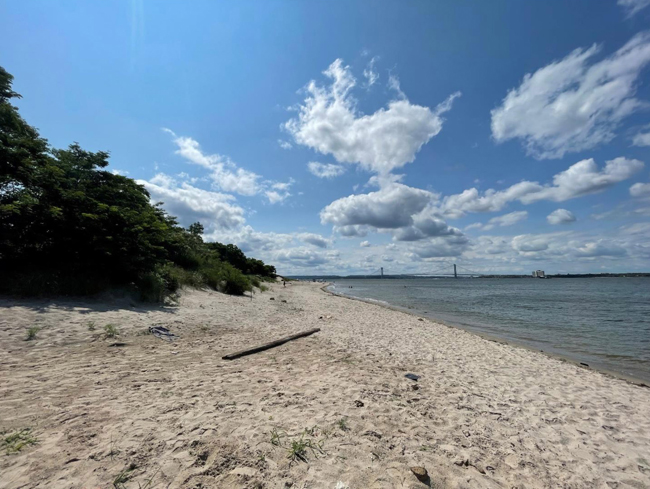
The shoreline at Coney Island Creek. Credit: National Wildlife Federation
Contact:
Hannah Burnett, NYSG Coastal Resilience Extension Specialist, E: heb84@cornell.edu, P: (718) 841-7609
The Resilient Schools Consortium program provides New York City youth with opportunities to better understand and address climate impacts in their neighborhoods
Brooklyn, NY, March 25, 2024 - Climate change — from extreme heat to sea level rise and storms — is impacting the lives of residents in New York City, with the local sea level expected to rise another 1.41 ft. to 3.25 ft by the year 2070 (sealevel.nasa.gov). Young people in urban coastal communities will be especially affected by these changes, and are confronted with the need to adapt to and solve climate-related challenges.
A “Resilient Schools Consortium” (RiSC) was launched in 2016 to empower students to understand and address climate impacts in their New York City neighborhoods. In support of the project, New York Sea Grant (NYSG) helped design and implement a locally-specific climate curriculum in collaboration with teachers and partner organizations.
On June 6, 2023, NYSG led a “blue line action” activity to demonstrate the impacts of sea level rise and greenhouse gas emissions to students from eight NYC public schools. Student teams met in Coney Island’s Kaiser Park for the National Wildlife Federation’s 2nd annual RiSC Community Open House: “Coney Island: Past, Present, and Future.” More than 100 middle and high school students walked from Coney Island Creek to Neptune Avenue and visualized sea level rise in 2100 under two different carbon emissions scenarios: “aggressive reductions,” standing at the shore-line, and “no reductions/business as usual,” as “seen” from the major thoroughfare of Neptune Avenue.
The students shared that by participating in the day they learned about sea level rise and climate justice. The RiSC program has been implemented in climate-vulnerable communities in NYC, Texas, and New Jersey, adopted in the U.S. Virgin Islands, and will soon be translated into Spanish and piloted in frontline communities in Puerto Rico.
Project Partners:
• National Wildlife Federation
• Coney Island Beautification Project
More Info: New York Sea Grant
New York Sea Grant (NYSG), a cooperative program of Cornell University
and the State University of New York (SUNY), is one of 34 university-based
programs under the National Oceanic and Atmospheric Administration’s
National Sea Grant College Program.
Since 1971, NYSG has represented a statewide network of integrated
research, education and extension services promoting coastal community
economic vitality, environmental sustainability and citizen awareness
and understanding about the State’s marine and Great Lakes resources.
Through NYSG’s efforts, the combined talents of university scientists
and extension specialists help develop and transfer science-based
information to many coastal user groups—businesses and industries,
federal, state and local government decision-makers and agency managers,
educators, the media and the interested public.
The program maintains Great Lakes offices at Cornell University, SUNY
Buffalo, Rochester Institute of Technology, SUNY Oswego, the Wayne County Cooperative Extension office
in Newark, and in Watertown. In the State's marine waters, NYSG has offices at Stony Brook
University and with Cornell Cooperative Extension of Nassau County on Long Island, in Queens, at Brooklyn College, with Cornell Cooperative
Extension in NYC, in Bronx, with Cornell Cooperative Extension of Ulster County in Kingston, and with Cornell Cooperative Extension of Westchester County in Elmsford.
For updates on Sea Grant activities: www.nyseagrant.org has Facebook, Twitter/X, Instagram, and YouTube links. NYSG offers a free e-list sign up via www.nyseagrant.org/nycoastlines for its flagship publication, NY Coastlines/Currents, which is published quarterly.